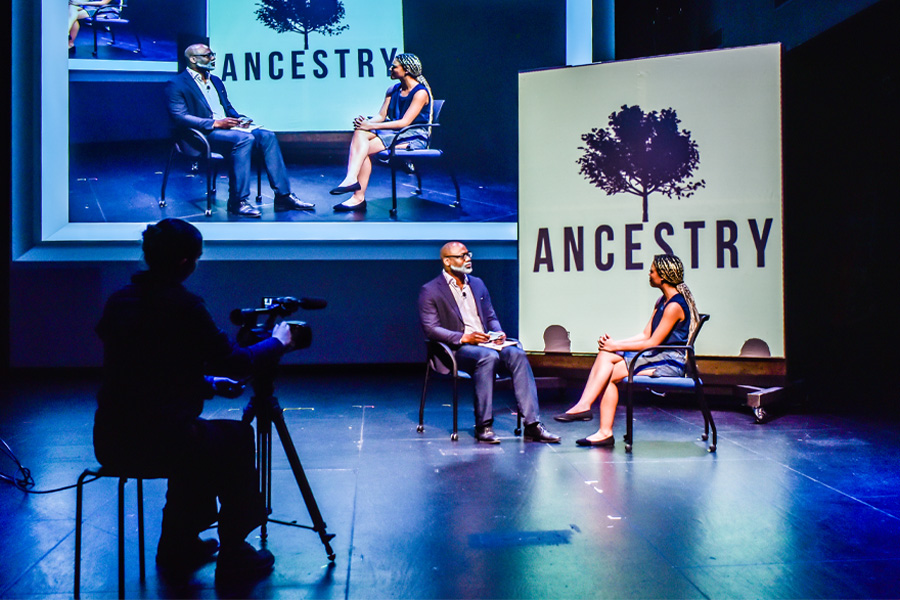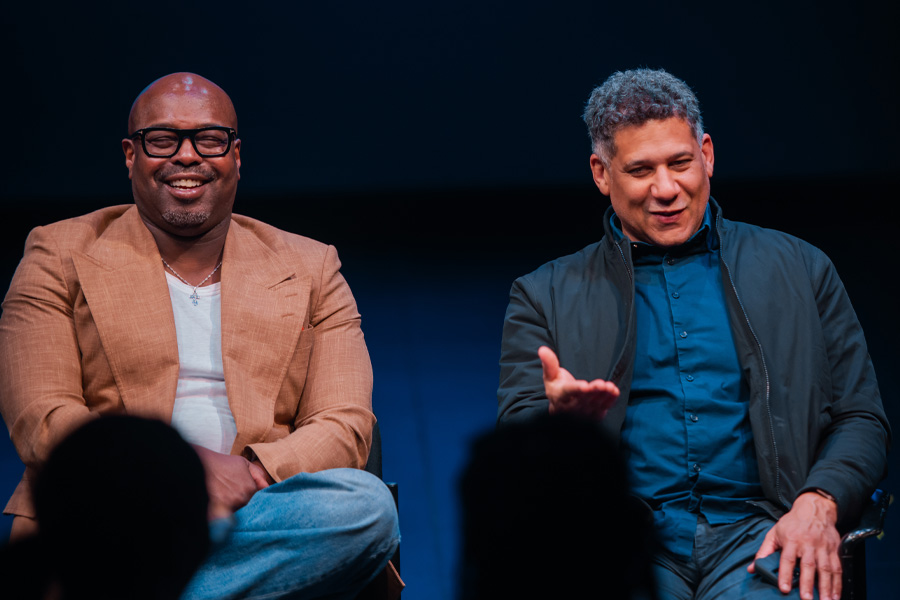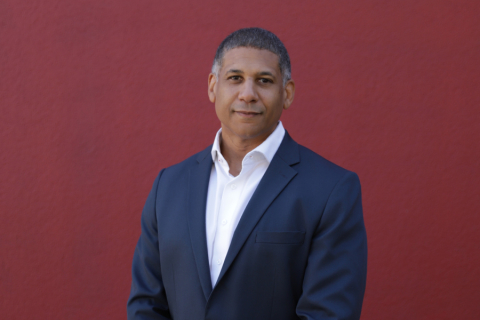Ancestral Stories
Zachary Price returns to his dramatist roots in a new play that explores racial injustice: A Q&A session
Department of Drama Associate Professor of Doctoral Studies Zachary Price premiered performances of Ancestry as part of the International Theater of Community Festival at UC Irvine on Feb. 22, 2025. Rooted in the University of California’s commitments to respect, learning and justice, Theater of Community engages the university’s values through performances, workshops and dialogue on bias and bigotry. Directed by Department of Drama Assistant Professor of Teaching Daniel Keeling and written by Price, Ancestry is inspired by true events in 2015 when an Ivy League professor attempted to conceal a Hollywood mogul’s slave-owning family’s past, dramatizing the injustice of slavery and its fundamental relationship to academia and the entertainment industry.
Q: What inspired you to write Ancestry? How did your background in theater and community engagement inform the themes and characters within the play?
Zachary Price (ZP): I started thinking about writing Ancestry when I read about an incident that took place at Harvard University. That became the catalyst for the play. Exploring these ideas within the framework of the play, though, is much broader and deeper than just what was in the popular imagination of the situation I read about in the news.
I received my M.F.A. in playwriting from the New School University. So in many ways, writing this play is a return to those roots as a dramatist. As a theater practitioner, though, I have always been doing a particular kind of cultural production, even though my focus recently has been on scholarly and theoretical writing. Such writing has also been a form of collaboration with various interlocutors, both in the theater and film community, and other performing arts environments, as well as outside of performing arts environments. So, the characters in the play are very much informed by a conjunction of my work as a researcher and a scholar, but also my desire to think about practice-based research or research as praxis from the perspective of a playwright.

Image: Ancestry performed in the Experimental Media Performance Lab (xMPL). Photo by Evelina Pentcheva.
Q: Can you share insights into your creative process for this play? Were there specific sources, texts or experiences that influenced your writing?
ZP: In Spring 2023, after I finished teaching for the school year, I began writing the play. I wrote a draft quickly because I kept seeing the headlines re-emerge around the initial story that inspired or sparked my imagination to write this play. It was as if it kept teasing me and presenting itself with opportunities for exploration. But so much of that is also informed by questions of lineage, ancestry, identity and what we inherit. Bound up in all of that are questions of power and agency. The things that we inherit can be things that we benefit greatly from, but they can also be things that, in some ways, present challenges.
During the Q&A sessions for the play as well as the rehearsal process, I think people will have identified ways in which intergenerational trauma is passed on or can be passed on, and how intergenerational wealth and certain kinds of privileges are also passed on.
With specific texts, I would say that I am influenced by a lot of both theater and performance studies scholarship that I read, as well as Black studies scholarship and dramatic literature. Significantly, though, the play speaks to the Harvard and Slavery and the Yale and Slavery working groups that are part of addressing the fact that Ivy League institutions and pretty much all institutions in the U.S. profited or benefited in some capacity from slavery or the legacy of slavery. Particularly, Ivy League institutions and even U.S. institutions like Georgetown and other Jesuit institutions have admittedly had to face — or at least attempt to face the fact that these institutions owned people as property. And some of the scholarship and writings around that history, which are simply facts, inform Ancestry.
Q: How do the themes in the play reflect your broader body of work or your academic interests?
ZP: I consider myself to be a playwright and a scholar of American theater, especially contemporary American theater and performance. I have an M.F.A. and a doctorate, and I focus on African American theatre history and Black cultural production. While my first book examined martial arts as a performance modality in varying spaces and contexts, I am currently working on a book about Lloyd Richards, the original director of Lorraine Hansberry’s Raisin in the Sun. The play was the first Black play ever produced on Broadway that was not a musical, and Richards and Hansberry made history in 1959 when it premiered at the Ethel Barrymore Theatre in New York. Unfortunately, Hansberry passed away young, but Richards was a prolific director. He was the first and only African American dean of Yale Drama, the first artistic director of the Eugene O'Neill Playwrights Festival and simultaneously spearheaded the Yale Repertory Theatre. Importantly, Richards was the director of the first of six August Wilson plays and cultivated and mentored August Wilson and numerous playwrights in the U.S and globally. He was also a dramaturg and someone who worked closely with playwrights in developing their vision and their new works. So, I am inspired by him. And I think that my dramatic writing is in the legacy of someone like Lloyd Richards, but that also includes my research, which is also in the legacy of Lloyd Richards. I'm trying to do two different things at the same time, both creative practice and scholarly practice, which, of course, inform each other. It takes a lot of focus, a lot of discipline, and it takes time. But it is incredibly rewarding.
Image: Ancestry performed in the Experimental Media Performance Lab (xMPL). Photo by Evelina Pentcheva.
Q: What challenges did you encounter while developing Ancestry, and how did you navigate them creatively?
ZP: There were a lot of challenges just in terms of resources. Attempting to pool those resources together was not easy. Fortunately, we have amazing alumni, current students and people within the broader theater and film network of Southern California who have contributed to this project. In fact, at one point, we even had someone from biomedical engineering, Professor Tim Downing, working with us during the rehearsal as an understudy and he was exceptional. We really appreciated his hard work and contribution.
I was truly honored to work with my colleague Daniel Keeling and my co-director and collaborator, Bryan Reynolds. We had amazing stage management support from Logan Brubaker and a ton of other people who have contributed to this project. With that said, it wasn't always easy to address some of the content and the play. And I think one of the mistakes that I made was not doing more dramaturgical discussions with the cast and the crew early on about the heaviness of the play’s content. We wound up addressing that during the rehearsal process. But I was reminded that it is important to sometimes start with more of the dramaturgical work when approaching this content, and yet at the same time, because we are working at the margins, we didn’t have the same support structure —the same resources and assets that the mainstage or mainstream apparatus provides. Those are just facts. And it is also a reminder of the additional challenges that Black theatre continues to face — the ghosts of the past continue to dance with us and August Wilson’s demands for the support for Black theatre is just as true now as it was in 1997 when he spoke the words “The Ground on Which I Stand.”
I still very much consider myself a student of theatre studies and performance studies, and even though I'm a professor, scholar and playwright, I consider myself someone who is constantly learning, rethinking and discovering the process of theater and theatrical practice. Again, I am truly inspired by the undergraduate students, the graduate students, faculty, staff, alumni and broader community that contributed to not only Ancestry but to Theater of Community as a whole. And that includes the audiences that have come out and participated as witnesses, spectators, and collaborators, especially during the post-show discussions.
Q: How has the collaborative process with the cast and production team influenced the evolution of the play?
ZP: One of the great things about being in a research university is that you have people who are critically engaged and are intellectuals. Both students and faculty can collaborate and dig into materials that may be difficult to address outside of the Research 1 university environment. The university should be a space for inquiry, collaboration, agreement and disagreement in which people are in a state of constant discovery and exchanging of ideas. That's especially true in theater and the performing arts.
The entire cast and crew helped the play develop as text throughout the rehearsal process by asking questions about their characters, the history, the issues of representation within the American theatrical landscape and how to deal with the play’s content. This process helped me as a playwright refine my own thinking process and make edits. Sometimes, I made these edits and revisions right there on the spot as I was sitting in the rehearsal and listening to what people were saying what they were doing, how they were responding and the questions that they had with each other, questions that they asked of me and importantly, questions that they asked of the director, Daniel Keeling. This kind of dramaturgical work is so fundamental to the success of any playwright or any new dramatic literature.
I think it's also important for undergraduate and graduate students to learn how to be in the rehearsal process and the rehearsal space, asking questions and engaging in dialogue with the creative team of a new play, or even an extant play. And I would also extend that to working on film and new media. And any kind of performing arts process. Importantly, I would extend that to the classroom, which is a performance/pedagogical space and a place of inquiry. That might be frustrating for some to comprehend, especially those who see theatre and performing arts as a simple vocational training, but silencing of dissenting voices leads to essentialism, and it is important to push back against the impulse of anti-intellectualism.
Q: As this festival is brought in part by the UC Irvine Office of Inclusive Excellence Confronting Extremism Award, was there an intentional decision to schedule performances of Ancestry during the last week of Black History Month and on W.E.B. Du Bois’ Birthday?
ZP: Wow, that's a great point. I didn't figure that into the calculus of the schedule. And in all transparency, this didn't have anything to do initially with Black History Month. Rather, it was a more a question of how we could best find a space that would be conducive to working with new works, to working with artists from all over the world and a space that would also be conducive to workshops, panels, solo performances as well as ensemble pieces and new media and technology.
A lot of the decisions that were made early on were about finding available spaces on campus that would support the vision of Theater of Community. With that said, I'm pleased that we were able to honor Dr. Du Bois and that this process unfolded during Black History Month — a period of time which is important for remembrance and also for thinking about what the American historical narrative is and how it is told. While it may not seem like it needs to be said, I would like to remind folks that right now there are parts of the country that are participating in book banning and book burning. Will they start banning performing arts as well? We have seen assaults on the National Endowments for the Arts before, and these assaults are, by in large, a constant response to the 1954 Brown V. Board of Education ruling and subsequent advances made by the Civil Rights Acts of 1964 and 1965, and then again in 1968. Of course, Black intellectuals such as Dr. Carter G. Woodson had advocated for the acknowledgement of the contributions of Black people in America starting in 1926. Ironically, it was Gerald Ford, who assumed the presidency after Nixon resigned, who finally codified Black History in 1976. Again, those are facts.

Image: (left to right) Daniel Keeling and Zachary Price during a performance talkback of Ancestry in the Experimental Media Performance Lab (xMPL). Photo by Evelina Pentcheva.
Q: With the production being performed within the International Theater of Community Festival, what conversations and sentiments do you hope audiences take away from the performance?
ZP: Well, within the larger framework of the International Theater of Community Festival, I think we've had a multiplicity of different perspectives and views represented by the artists and activists who have participated, but also by the different audiences that have come in and participated as observers and discussants. So, to that extent, I think we've been quite successful in our outreach in terms of bringing in audiences from across the university and even from across the state — to have a conversation about what they understand as the various components that form and inform who we are as both individuals and as a collective society. That's not to say that we all agree, or that our experiences are even all the same. One of the dangers, I think, is that we oftentimes grasp for the motto of “arts, for art's sake,” or that all stories are human stories. We also have to understand that there are incredible differences in how we experience the world, how we tell stories and what kind of stories we tell. That is not easy. Rather, it is easy to universalize and flatten, again, to essentialize. We must resist that temptation. If there's one space left to not universalize, I think it's within the university environment. I hope that audiences have been edified through the dialogues that we have fostered. I've learned a lot by working with the various artists and activists that we've had as part of the festival. I’ve also learned a lot from the students who have worked on different components of the festival and especially on Ancestry. I cannot thank them enough for working against the grain and forging new pathways. There's always more to learn, and that's what makes the learning process and the creative process so exciting.
To learn more about the International Theater of Community Festival, visit here. To learn more about Zachary Price’s pedagogy and praxis, visit his Department of Drama bio page here.

